Ask the Doctor
We know you've got questions, so this is the place to get those answered. If there's anything here that needs clarity, please feel free to give our office a call!
All You Need to Know
Could The Coronavirus Be Impacting My Sleep?
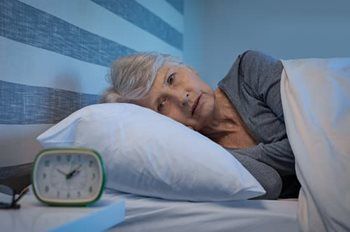
All of the uncertainty surrounding the COVID-19 pandemic can lead to increased anxiety and stress. Many of us are spending time worrying about the things that are out of our control. While feeling anxious and stressed is a natural reaction to uncertain times, it can start to take a toll on your sleep:
- Fears of yourself or loved ones contracting the coronavirus, economic concerns and the uncertainty of the unknown cause elevated anxiety cause your mind to race making it harder to fall asleep.
- Canceled plans, isolation from friends, and time cooped up at home can place a strain on anyone. Keeping up with work-from-home obligations while also managing your child’s remote learning, generates stress and that can add to sleeplessness.
- Having more downtime and lower energy levels during the day promotes napping which can make it harder to fall asleep at night.
- Spending so much time staring at screens (TV, computers, tablets smartphones) impacts our ability to sleep. Not only does screen time stimulate the brain making it hard to wind down, but the blue light from screens can suppress the natural production of melatonin, a hormone that the body makes to help us sleep.
We all know getting enough sleep is important, but it is even more important now. Getting enough sleep:
- Boosts Your Immune System: Sleep supports the immune system, so a lack of sleep or excessive stress, directly impacts the immune system function. When your body is not getting the sleep it needs the immune system will not work as efficiently as it would if you were well rested leaving you more vulnerable to sickness. Sleep also provides our immune system the chance to recoup and reevaluate how best to attack invaders. Without enough rest, it will have a difficult time developing antibodies and keeping up defenses.
- Improves Your Mood: Getting ample sleep maximizes your potential for having a better day under these circumstances. Sleep helps regulate mood, improves brain function, and increases energy and overall productivity during the day.
- Improves Your Brain Function: Let’s face it, our brain works a lot better when we get enough sleep. Sleep helps with complex thinking, learning, memory, decision-making and allows us to feel sharp.
- Improves Mental Health: Along with depression studies have also found that a lack of sleep is linked to mental health conditions like anxiety disorder, bipolar disorder, and PTSD.
While getting enough sleep is important, try not to worry about it! Worrying about sleep just creates more stress making it even harder to sleep. Instead, just do your best to get to bed on time and follow these tips to help you get a better night’s sleep:
- Create daytime routine: Schedule things like exercise, meals, work and socializing at certain times to help add structure to your days and will help when it comes to keeping a wake time and bedtime.
- Limit naps throughout the day: If you decide to take a nap, it should be for 30 minutes or less and before 2 pm. If you are having trouble falling asleep at night, try cutting out naps.
- Limit screen time at night: Turn off your devices at least one hour before bedtime. Leave your cell phone charging in the kitchen so you are not tempted to look at it during the night.
- Relax Before Bed: Take the hour before bedtime for yourself. Put away electronic devices, take a hot bath/shower, listen to music, try a meditation app, read a book/magazine and enjoy some herbal tea.
- Create a sleep schedule: Prioritize the amount of sleep you get each night. Most adults require seven to eight hours, while some require more or less. Since the majority of us are at home sheltering in place without the excuse of social obligations, getting to bed "on time” is more realistic right now!
While it there are so many things that are out of our control, it’s important you do your best to focus on what you can’t control, like taking care of yourself! If you are having trouble when it comes to sleep, Dr. Mushlin at Advocare Pulmonary and Sleep Specialists can help.
What Is Telemedicine? How Does It Work? How Can I Schedule An Appointment?

At Advocare Pulmonary and Sleep Specialists, nothing is more important to us than the health and well being of our patients, staff and the communities we serve.
While abiding by the shelter in place recommendations is important, so is your health. We’re here to remind you that you should never wait when it comes to your health!
If you are having sleep or pulmonary concerns please know that we are still here to help. We are currently conducting telemedicine consultations with patients which allows us to have detailed conversations about your care - just like at an in person visit, but while still practicing social distancing.
This face-to-face interaction many times allows us to observe, run through diagnostics and even recommend at home treatments. We are also still able to call in prescriptions if necessary.
How Does It Work?
You don’t need anything special to take part in a telemedicine appointment, just a device that can make video calls (like a smartphone, tablet or laptop) and an internet connection.
Scheduling An Appointment
You can schedule a telemedicine appointment just as you would a regular in office appointment by calling the office.
At Advocare Pulmonary and Sleep Specialists being there for our patients during this unprecedented time is our top priority. We’re doing our part to keep you and your family safe, while working hard to make sure that high-quality care options are available for everyone.
If you have any questions about telemedicine, or would like to set up an appointment please contact our office today!
Exton: (610) 359-5858
Lansdale: (215) 832-0111
West Chester: (484) 999-2100
King of Prussia: (484) 690-4200
Coronavirus Has Me Feeling Stressed... What Can I Do?

Details surrounding the COVID-19 outbreak continue to unfold so it’s only normal to feel increasingly stressed. Information seems to be changing all the time and that can be overwhelming, confusing and at times unsettling.
As if that wasn’t enough, the world as we know it has changed. We have been forced to limit interactions with others, and for many working from home and helping the kids with online schooling has become the norm. Adjusting to new situations can cause stress an anxiety levels to rise, which has both mental and physical impacts.
What Can You Do?
Take Action Over The Things You Can Control: With so much uncertainty it’s easy to focus on all of the things you can’t control, rather than what you can control. Instead of worrying about the uncontrollable, try to refocus and take action of the things that are in your control. For example if you are worried about your health, you can take action by washing your hands regularly, cleaning your home and avoiding crowds.
Get Enough Sleep: While worrying about the Coronavirus may be keeping you up at night, stress can become amplified when you don’t get enough sleep. During times like this it’s important to make sure you are getting the recommended amount of sleep each night. Are you struggling to fall asleep? Try creating a relaxing bedtime routine. Take a warm shower or bath, or enjoy a cup of herbal tea. Avoid stimulants like alcohol, caffeine and nicotine before bed.
Continue To Exercise: Even though the gym is closed it’s still possible to keep active. Take a walk around the neighborhood, spend sometime in the yard with the kids and pets, or try some yoga to help calm your mind and body. Staying active can help you feel better and help maintain a positive outlook.
Take A Break From The News: It’s on television, on the radio and woven throughout your social media feed and while it’s important to stay informed the constant influx of coronavirus information can at times become overwhelming. It’s important that you find a balance that works for you. Feeling overwhelmed and stressed? Try disconnecting for a bit and do something that is completely unrelated to coronavirus, like reading a book, playing boardgames or even reorganizing the garage.
Maintain A Healthy Diet: Being home 24/7 can have an impact on our eating habits and metabolism. Many people tend to snack more when they feel stressed. If you are a stress snacker try keeping healthy snacks on hand that will help you maintain your energy levels and prevent mood swings.
Continue To Connect With Others: While getting together to watch the game, or for happy hour might not be possible right now, it doesn’t mean we can’t still spend time with friends and family. Connecting with others is so important when it comes to managing mental health and stress, especially during times like this. Isolation can lead to feelings of depression and increased anxiety. Be sure to continue check in with family and friends through phone, text or FaceTime. It’s amazing how much a chat with a good friend can lift your mood.
If you find yourself feeling overly stressed, depressed or tired, Advocare Pulmonary and Sleep Specialists can help. Helping our patients during this unprecedented time is our top priority. Along with helping you sleep better, we have partnered with others to provide resources to assist patients with stress and depression. If you are in need of help, please do not hesitate to contact our office!
Can Summer Weather Make Breathing More Challenging?
Certain weather conditions can make it harder to breathe, especially for those with chronic lung conditions. In summer when heat and humidity begin to rise, many patients suffering with lung conditions feel as if they cannot catch their breath. It is important for those suffering to learn to adapt their lifestyle when weather conditions can trigger asthma, allergies or COPD.
If you are affected by a lung condition such as COPD or asthma your body is already using much of its energy to breath. When high heat and humidity are present it makes breathing more difficult. Extreme summer conditions can cause your body to take its focus off of breathing and onto keeping you cool. Air quality often declines during periods of hot and humid weather meaning pollutants are more likely to be breathed in and irritate your lungs.
Tips For Breathing Easier
- Continue to use your medications as directed by your doctor.
- Stay indoors on the hottest days when the air quality is poor
- Avoid triggers like smoke, mold, dust and cleaning products.
- Avoid exercising outdoors.
- Stay hydrated.
If you are suffering with a lung condition or are having trouble breathing this summer contact Advocare Pulmonary and Sleep Specialists today. We have two convenient office locations in Exton and Lansdale. Schedule an appointment and start breathing easier today!
Does Diabetes Impact Lung Function?
Diabetes & Types
Diabetes is a group of diseases that effect the body’s ability to produce or to respond to insulin. Insulin is the hormone responsible for allowing your body to utilize the glucose it receives from food. The inability to produce or respond to insulin results in elevated glucose levels in the blood.
The most common forms of diabetes are Type I and Type II. Type I diabetes is a condition which causes the pancreas to produce little to no insulin. Type II diabetes affects how the body responds to insulin and is often caused by poor diet or lack of exercise. Type I diabetes is often caused by genetics alone, while Type II diabetes is caused by a mixture of genetic and environmental factors.
Diabetes can affect all systems of the body and can cause some long-term complications including heard and blood vessel damage, nerve damage, kidney damage, eye damage, skin conditions and hearing impairments.
Diabetes & Your Lungs
Recent studies have shown that adults with Type I or Type II are more likely to have asthma, chronic obstructive pulmonary disease (COPD) and pulmonary fibrosis. Those suffering with diabetes are also more likely to be hospitalized for pneumonia. While the exact reasoning is not clear, some scientists suggest that the cause of decreased lung capacity and function is inflammation. Others feel lung function decreases as blood glucose levels increase due to diabetes.
How Are My Lung Functioning?
A pulmonologist can determine and monitor your lung function through Pulmonary Function Testing. Pulmonary Function Tests help identify:
- The strength of your muscles used for breathing
- How well your lungs deliver oxygen to your blood
- How much air you can take into your lungs
- How much air you can exhale and how quickly you can
Pulmonary Function Tests may not show exactly what is causing pulmonary problems, but they will show how well your lungs function. In order to find the underlying causes, a pulmonologist may order a chest X-ray or CT scan.
If you have diabetes and are experiencing symptoms associated with pulmonary disorders, our experts at Advocare Pulmonary and Sleep can give you a Pulmonary Function Test. Dr. Muslin will diagnose and treat any pulmonary disorders that may be related to your diabetes. Schedule your appointment today.
Can I Improve My Lung Function?

Each day your lungs absorb oxygen from the air you breathe and transport it into your blood stream. Your lungs also transport carbon dioxide from your blood and release it back into the atmosphere. Keeping your lungs healthy plays an important role in keeping your body in good health.
Some ways you can improve your lung function:
- Exercise Regularly – Aerobic exercise helps increase your lung volume and aerobic capacity. Aerobic exercise is also referred to as cardio and includes exercises like running, swimming, cycling and rowing.
- Practice Deep Breathing - Three to five minutes of deep breathing throughout the day can drastically improve lung function overtime. This easy exercise can increase the oxygen level in your blood and decrease your heart rate so it benefits both your respiratory and cardiovascular systems. Try inhaling for six seconds and exhaling for 8 seconds.
- Improve Your Indoor Air Quality – If the air inside your home contains chemicals or mold, your lungs may be hurting for some clean oxygen. Adding an air purifier or a few plants to your living space will aid in cleaning up the air. Plants turn the carbon dioxide in the air back into breathable oxygen and many also filter out harmful toxins from the air in the process making them all natural air filters (and great decorations).
- Quit Smoking - We all know smoking is harmful to your body, but it is especially harmful to your lungs. More than just increasing your risk of cancer, smoking takes a toll on your lungs by narrowing your air passageways making it harder to breathe.
Regular health care is key to maintaining healthy and happy lungs. The team at Advocare Pulmonary and Sleep Specialists are here to ensure your lungs are healthy and stay healthy. Dr. Mushlin is equipped to diagnose and treat a variety of pulmonary conditions including asthma, bronchitis, respiratory failure, lung cancer, lung infections, COPD and sleep disorders. Schedule your appointment today.
What Are The Dangers Of Sleep Apnea?

Patients with sleep apnea often snore throughout the night more so than the average person. Unfortunately annoyed family members are the least of their problems!
Sleep apnea is a very serious disorder that interrupts how you breathe during sleep. When you stop breathing your brain and body do not receive enough oxygen. The most common type of sleep apnea is obstructive sleep apnea, which occurs when the soft tissue of the throat collapses while breathing at night.
Symptoms of sleep apnea should not be ignored and can include sore throat, loud snoring, lack of energy, headaches, mood changes, and insomnia. If left untreated patients can encounter some serious health risks including:
High Blood Pressure
Sleep apnea causes high blood pressure due to hormonal changes in the body. Lack of oxygen at night contributes to increased levels of hormones, which can result in increased blood pressure.
Heart Disease
Obstructive sleep apnea impacts your heart’s functionality. The lack of oxygen causes increased stress on the heart, which can lead to a stroke or heart attack if left untreated for a period of time.
Diabetes & Weight Gain
When the body doesn’t get enough sleep, it is unable to process insulin properly which is why obstructive sleep apnea is often linked to Type 2 Diabetes. Incorrect insulin processing can lead to weight gain. Excess weight can result in fatty deposits forming in an patient’s neck which can make it harder to breathe, especially when laying down at night resulting in sleep apnea.
Sleep apnea causes the body to release the hormone ghrlein, which causes you to crave sweets and sugar. Consuming mostly sweets and sugar does not allow your body to fuel itself properly and can also lead to weight gain.
Acid Reflux and GERD
Acid reflux is common in patients with Sleep apnea. When these patients are sleeping their throats open in close in a way that is not ideal. As air flows in and out it can cause Gastroesophageal reflux Disease (GERD) when the pressure sucks the contents of the stomach back into the esophagus causing heartburn.
Headaches & Mood Disorders
If left untreated lack of sleep can cause headache and moods swings. You may find yourself becoming angry or upset over nothing. Getting a good night’s sleep is integral to emotional stability, and interrupted sleep due to sleep apnea will begin to impact how you function.
If you or someone you love is feeling the impact of untreated sleep apnea, contact Advocare Pulmonary and Sleep Specialists today. Let Dr. Mushlin diagnose your condition and put a treatment plan in place to get you back on the path to better health and a good night’s sleep. Learn more by contact
Why Do I Wake Up Tired?

You may know the feeling, your alarm goes off and it’s a struggle to get out of bed and begin your day. You may find yourself yawning, feeling groggy, and focusing on the tasks of your day may feel like a challenge. All you want to do is crawl back into bed, but you can’t, so what can you do to reduce this tired feeling.
Get More Sleep
If you wake up feeling tired, it may be because you actually are tired. What you think is enough sleep, may just not be enough. The American Academy of Sleep Medicine and Sleep Research Society recommends that adults between the ages of 18-60 get at least 7 hours of sleep per night to maintain optimal health. How does your sleep total compare? If you are averaging less than 7 hours a night, your body may be trying to tell you that you need to make getting more sleep a priority. Try adjusting your schedule to establish an evening routine that allows you to get 7 or more hours of sleep a night.
Get Quality Sleep
While you may be heading to bed around the same time each evening, and allowing for a minimum of 7 hours of sleep each night, the sleep you are getting may not be of the best quality. Each night your body goes through four different stages of sleep. The third stage is called slow-wave sleep and this is the deep sleep you need in order to wake up feeling refreshed in the morning. There are many things that can disrupt your sleep and prevent you from entering the third stage. Disruptions such as loud noises, bright lights, a snoring spouse, a room that is too hot, an uncomfortable mattress or pillow or even a nightmares can all rob you of the deep sleep you need. Adjusting your sleep conditions to promote quality sleep can help you achieve more stage 3 sleep allowing you to wake feeling rested and refreshed.
Become More Active
When you are feeling tired exercise is probably not the first thing that comes to mind, but studies have shown that there is a correlation between exercise and sleep. Individuals who exercise regularly and remain active are proven to have better sleep than those who are less active. Consider adding a morning run or an early yoga class to your routine. Overtime, regular exercise can lead to a better night’s rest.
Adjust Your Eating Habits
Eating a healthy balanced diet has many benefits when it comes to your health so make sure you are not skipping meals and that you are drinking plenty of water. Beyond getting the vitamins and nutrients your body needs to function properly, when you eat and drink can also have an impact your sleep. For example, caffeine stays in your system long after you consume it, so the coffee you drink to get through that mid afternoon slump may be the reason you are having trouble falling asleep. It takes about 3-4 hours for your stomach to empty after a meal so be sure that you leave at least that amount of time between dinner and bedtime to reduce the chances that heartburn or acid reflux will disrupt your sleep.
Stop Hitting Snooze
You may feel like you are doing yourself a favor by hitting snooze and getting those extra few minutes, but the snooze button is not your friend! When you wake up your brain shuts off your sleep hormone (melatonin) and boosts Cortisol production to help get you up and going. When you hit snooze continually, your body gets confused as to which mode you should be in which can lead to you falling into a half-asleep, half-awake state. To break this habit, try moving your alarm clock across the room so that you have to get out of bed to turn it off. Once you’re up, stay up!
If you try these tips, but still wake up feeling tired your morning grogginess could be a result of a more serious sleep disorder like sleep apnea, narcolepsy, or insomnia. Dr. Mushlin and Advocare Pulmonary and Sleep Specialists can help. Schedule an appointment at our Exton Office (610) 359-5858 or Lansdale office (215) 832-0111 today and get on the path to getting a better night sleep!
What is Bronchiectasis?

Bronchiectasis is caused when damage occurs to the airways that carry oxygen in and out of the lungs. This damage causes mucus that would normally move through the airways to become trapped in the airways where it accumulates. This leads to bacteria growth, lung infections and causes trouble breathing. When left untreated, Bronchiectasis can lead to other health problems such as respiratory failure, lung collapse or heart failure.
Symptoms of Bronchiectasis
One of the most telling symptoms of Bronchiectasis is an individual that has repeated lung infections throughout their life. The damage caused by lung infections is not always evident until years after the fact so patients may not experience any symptoms in the early stages. When symptoms are present, the most common include:
- Shortness of breath
- Wheezing
- Chest pain
- Daily cough over months and years
- Daily and frequent need to spit
- Tiredness and exhaustion
- Coughing up blood
Causes of Bronchiectasis
Brochiectasis can be congenital or acquired. Congenital Bronchiectasis affects infants and children and is related to how the lungs formed as a fetus. Acquired Bronchiectasis is much more common and is caused by a medical condition or by a lung infection that has caused damage to the airway walls.
Conditions that can lead to Bronchiectasis include:
- Whooping cough
- Cystic Fibrosis
- Fungal Infections
- Immunodeficiency disorders
- Connective tissue disorders
- Tuberculosis
- Severe pneumonia
Diagnosis and Treatment of Bronchiectasis
Bronchiectasis can be diagnosed in a number of ways including blood tests to check for conditions related to Bronchiectasis, a Chest scan or X-ray to view the lungs structure, or a collection of mucus to check for the growth of bacteria or other microbes.
If it is determined that you have Bronchiectasis there are numerous treatment options available. Treating Bronchiectasis with antibiotics is common because bacteria are often the cause of infection. Macrolides, another type of antibiotic, are commonly used because like a regular antibiotic they kill bacteria but they also help reduce inflammation.
In addition to antibiotics for infection, mucus thinning medications and devices are also often used in the treatment of Bronchiectasis. These medications and devices help patients clear out mucus by dissolving it, or making it easier to expel.
If you or someone you know suffers from frequent lung infections or from a condition that is at risk for causing Bronchiectasis it is important to visit a pulmonologist. At Advocare Pulmonary and Sleep Specialists, we are trained to diagnose and treat Bronchiectasis along with many other pulmonary and sleep conditions. Contact us for more information or to schedule an appointment today, Exton Office (610) 359-5858 or Lansdale Office (215) 832-0111.
Can Suffering With Allergies Impact My Sleep?
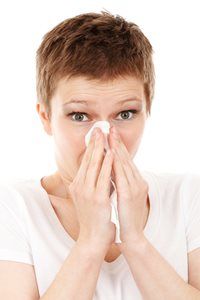
Spring can be a tough time of year for those with allergies. The flowers and trees are in full bloom, pollen is everywhere and you may find yourself suffering with irritated eyes, a scratchy throat and a stuffy nose.
Allergens are typically harmless substances that cause the immune system in some individuals to release chemicals called histamines. These histamines cause inflammation which results in symptoms like congestion, sneezing and watery eyes.
Whether your allergies are caused by seasonal allergens like pollen, or not so seasonal allergens like dust mites or pet dander, allergies do impact your sleep. Dealing with a runny nose, coughing and sneezing can make it more difficult to fall asleep. Restlessness and difficulty breathing can interrupt your sleep many times throughout the night. Without enough hours of rest, you may find yourself suffering with a headache, find it difficult to concentrate and even experience feelings of anxiety and depression.
While there is no way to completely avoid pollen and other allergens there are steps you can take to limit your exposure to them while indoors, especially in your bedroom.
- Keep Your Windows Closed: While letting the fresh air in may sound like a good thing, but opening a window allows pollen and other outdoor allergens to invade your home.
- Shower Before Bed: Even if you need rely on your morning shower to wake up, showering before bed can help by removing pollen and other allergens from your body so they don’t end up on your pajamas or in your bed.
- Swap Out Chemical Scents: Air Fresheners and candles often times contain harsh chemicals, which can irritate and trigger allergies. Laundry soaps with added fragrances can often times have the same effect so keep this in mind when washing your bedding. You may want to use a scent-free detergent.
- Fight The Dust Mites: Every home has some dust, but you do not need to let the dust mites take over. Make sure you wash pillows and bedding often as dust mites like to hide in these locations (where they feast on the skin cells you shed during sleep.)
- Clean the Air In Your Home: Change air filters like those on your central air and heating units often. This will help prevent the system from circulating allergens throughout your home. Using a portable air purifier with a HEPA filter can improve the air quality in rooms like your bedroom.
While allergies can be challenging to deal with, they do not need to prevent you from getting the quality of sleep you deserve. If you find yourself struggling with allergies and sleep, Dr. Mushlin and Advocare Pulmonary and Sleep Specialists can help. Contact our Exton office (610) 359-5858 or Lansdale office (215) 832-0111 to schedule your appointment today and start breathing easier and sleeping better!
What Is COPD?

Chronic Obstructive Pulmonary Disease is an umbrella term that describes a broad category of long-term, progressive diseases that cause some form of restriction of airflow. COPD includes diseases such as emphysema, chronic bronchitis, some forms of bronchiectasis and other diseases.
According to the Centers for Disease Control, primary COPD is the third leading cause of death in the United States. An estimated 15.7 million Americans have been diagnosed with COPD. Smoking, exposure to certain toxins and air quality can all contribute to breathing problems associated with COPD.
Symptoms of COPD
Symptoms of COPD include:
- Wheezing
- Increased breathlessness with activity
- Shortness of breath
- Chronic cough (with and without mucus)
- A feeling of tightness in the chest
Anyone with the following should get tested for COPD:
- A history of smoking
- Long term exposure to air pollutants (including second hand smoke)
- Chronic coughing with or without mucus
- Shortness of breath that has become worse with age
- Cannot keep up with others your own age
COPD is more common in patients over the age of 65, however symptoms can develop at any age. Those who smoke or have a history of smoking are at a much higher risk of developing COPD. Those with a history of asthma or who worked in environments with long-term airborne toxins are also at a higher risk for developing COPD. It is also believed that certain genetic factors play a role in making some individuals more likely to develop COPD so it is always beneficial to be mindful of family history.
Diagnosing COPD
A spirometry test is a simple non-invasive test that can be used to diagnose COPD. Your doctor will ask you to blow all the air out of your lungs into a mouthpiece, which is connected to a machine called a spirometer.
The spirometer measures the amount of air you blow out within the first second and the also the amount you blow out in six seconds or more. These measurements are then used by your doctor to determine the severity of your COPD and are used to develop the best treatment plan for you.
Treatment of COPD
There are a variety of treatment options that help patients manage their COPD. Since not all people with COPD share the same symptoms treatment often varies from patient to patient. Common treatments include:
- Smoking cessation: The most important step in any treatment plan for COPD is to stop all smoking. It is the only way to keep your COPD from becoming worse and further impacting your ability to breath.
- Medications: Several kinds of medications can be used to treat the symptoms and complications of COPD including bronchodilators, inhaled steroids, oral steroids, phosphodiesterase-4 inhibitors and antibiotics.
- Lung therapies: Additional therapies like oxygen therapy and pulmonary rehabilitation are often used for those with moderate or serve COPD.
- Surgery: Surgery is an option for some patients who are suffering from severe emphysema who aren’t helped sufficiently by medication alone. Surgical options include, lung volume reduction, lung transplant and bullectomy.
In most cases COPD can be managed with medications, a healthy lifestyle and by exercising self care habits. If you or a loved one is suffering with COPD or a related condition, Advocare Pulmonary and Sleep Specialists can help. To learn more about COPD and treatment options reach out to our Exton office (610) 359-5858 or Lansdale office (215) 832-0111 to schedule your appointment today.
What Is Insomnia?

What is Insomnia?
Insomnia can include trouble getting to sleep (onset) and trouble staying asleep (maintenance) even when a person has the opportunity to do so. Insomnia can be caused by psychiatric and medical conditions, unhealthy sleep habits and biological factors.
Types of Insomnia
Acute Insomnia: Acute insomnia is a type of insomnia that does not last very long, typically a week or less. It is normally caused by an interruption to your normal sleep schedule or an outside stressor like:
- Sleeping in a new place
- Interrupted sleep pattern due to holidays
- Stress due to a relationship issue
- Nerves about an upcoming meeting or exam
- Jet lag
Chronic Insomnia: Chronic insomnia is a long-term problem and affects a person for most of their life. It may last for months at a time and then go away, or can affect a person off and on for years. It is normally caused by:
- Circadian rhythm disorders
- Sleep disorders
- Severe anxiety
- Chronic stress
- Pain or discomfort at night
- Unhealthy sleep habits
Symptoms of Insomnia
Those who suffer with insomnia often feel dissatisfied with their sleep and normally experience one of more of the following:
- Difficulty falling asleep
- Difficulty staying asleep
- Waking up too early in the morning
- Non-restorative Sleep
- Sleepiness during the day
- Difficulty concentrating
- Mood disturbances
- Fatigue
- Low energy
- Decreased performance at work or school
Diagnosing Insomnia
There isn’t a definitive test for insomnia so doctors may use a variety of different tests and tools to diagnose and measure insomnia symptoms including:
- Sleep Log: Your doctor may ask you to keep a simple log of the details surrounding your sleep. You’ll be asked to record details like your bedtime, wake up time, how tired you feel at various times of the day. This is also helpful when it comes to determining the cause of your insomnia.
- Sleep inventory: An inventory can be used to gather information from you regarding your health, medical history and sleep patterns.
- Blood Test: Can be used to rule out medical conditions such as thyroid problems, which can cause disruption to sleep patterns in some patients.
- Sleep Study: A sleep study can be used to gather information about your nighttime sleep. During the study your stages of sleep, oxygen levels, body movements and heart and breathing patterns will be measured.
Treatment for Insomnia
Treatment for chronic insomnia includes treating any underlying conditions or health problems that are causing the insomnia. If your insomnia continues, your doctor may suggest behavior therapy. This approach helps you to change behaviors that can worsen insomnia and teaches you new behaviors to encourage sleep. Techniques like relaxation exercises, sleep restriction therapy, and reconditioning may be helpful.
Sleep hygiene can help you overcome insomnia by getting a good night’s sleep. If you are struggling with insomnia, whether acute or chronic try:
- Avoid prolonged use of phones or reading devices that give off light before bed. These devices can make it harder to fall asleep.
- Try going to sleep at the same time each night and getting up at the same time each morning. Try not to take naps during the day, as naps may make you less sleepy at night.
- Avoid caffeine, nicotine and alcohol late in the day. Caffeine and nicotine aer stimulants and can keep you from falling asleep. Alcohol can cause waking in the night and interferes with sleep quality.
- Get regular exercise, but try not to exercise close to bedtime as it may stimulate you and make it harder to fall asleep.
- Make you bedroom comfortable. Make sure it is dark, quiet and not too warm or cold.
- If you find yourself laying awake worrying abou things, try making a to do list before you go to bed. This may help you to not focus on those worries overnight.
- Don’t eat a heavy meal late in the day. A light snack before bedtime may help you fall asleep.
- Follow a routine to help you relax before sleep. Read a book, listen to music or take a bath.
- If you can’t fall asleep get up and do something that is not over stimulating until you feel sleepy.
If you think you may be suffering from insomnia, or another sleep disorder Dr. Mushlin and Advocare Pulmonary and Sleep Specialists can help you get back to sleep! Contact our Exton office (610) 359-5858 or Lansdale office (215) 832-0111 to schedule your appointment today!
How Do I Care For My CPAP Machine?
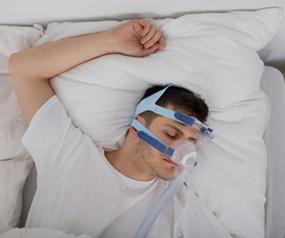
Caring For Your CPAP Machine
If your doctor has recently prescribed a CPAP machine for you or a loved one, it is important that you keep it clean and running. Your machine is there to protect your well-being, because untreated sleep apnea poses a very real threat to your health. Besides feeling run down and tired all of the time, people with prolonged sleep apnea tend to have a much higher risk for heart attacks and stroke. A well-maintained CPAP machine can dramatically improve your quality of life, helping you get the rest your body needs.
We know, life can get busy and it can be difficult to find the time to do it all. While it’s easy to continue to put off cleaning your CPAP equipment, we’re here to tell you to STOP PUTTING IT OFF!
Continuing to use your CPAP equipment without taking the time to clean it can lead to sinus and lung infections. CPAP machines tend to be dark, moist and warm, an ideal combo for many kinds of mold, bacteria and viruses. If possible, you should clean your tubing, mask and humidifier tub daily.
A vital part of keeping your equipment clean is to make sure you have the necessary supplies and tools. Keep supplies like mask wipes and sprays in a convenient place so that you can give your facemask a quick clean before using it each night. A tube brush is also helpful because it allows you to scrub out the tubing from both ends.
When to Clean Your CPAP Equipment
- Clean your CPAP mask on a daily basis.
- Clean your hose, humidifier tray, tubing and other CPAP supplies at least once a week
- Headgear, cushions, filters, tubes, chinstraps and tubes should all be replaced at regular intervals in accordance with manufacturer guidelines.
How to Clean Your CPAP Machine
- Unplug your machine. Unhook the tubing and use a tube brush to scrub out the inside. Run warm soapy water through both ends. Rinse it thoroughly and allow it to air dry before use. If you do this every morning, the tubing will be fresh and ready for use each night.
- Clean the water reservoir or chamber with warm soapy water. Rinse it thoroughly and set it aside to air dry. You should also use a recommended solution such as white vinegar and water each week. Mix two parts water to one part vinegar and allow it to sit for at least 10 to 15 minutes before removing it. Rinse the chamber with sterile distilled water.
- Clean your mask daily for best results. Take it apart and wipe the cushion with a moist warm cloth. Do not place the cushion in water. Follow the manufacturer’s direction and clean the rest of the headgear with warm soapy water and allow to air dry.
If you have questions about caring for your CPAP machine, or would like to schedule a sleep study, contact Advocare Pulmonary and Sleep Specialists at our Exton office (610) 359-5858 or Lansdale (215) 832-0111.
How Much Sleep Is Enough?

Are You Getting Enoug Sleep?
Sleep is something that many times we take for granted! Even though we know getting enough sleep is important to our health and well being.
Everyone needs sleep, but the amount of sleep an individual needs varies from person to person and also varies over time. Babies and young children require more sleep than adults. The hectic schedules and fluctuating hormones of teenagers also require them to have more sleep than adults in order to function and continue to grow. According to the National Sleep Foundation, teens require between 8 to 10 hours a night, whereas most adults can get by with between 7 to 9 hours of sleep a night.
When you aren’t getting enough sleep but still need to power through the day your risk of hypertension, weight gain and chronic diseases like diabetes and cardiovascular disease increases. Lack of sleep can weaken your immune system leaving you more susceptible to colds and other sickness. Tiredness also impacts a person’s ability to function both mentally and physically. Reaction times can slow leaving you more prone to accident or injury. You may find it harder to regulate your mood and handle everyday stresses.
There are many causes for sleep deprivation. Common causes include:
- Having a hectic schedule
- Consuming excessive amounts of caffeine or alcohol
- Stress and anxiety
- Poor sleeping (uncomfortable, too much light, too noisy)
- Health conditions (sleep apnea, migraine, chronic pain)
- Medications
Even though you know getting enough sleep is important making sure you get enough sleep isn’t always easy. Falling into poor routines hurts your ability to get the amount and quality of sleep you need.
If you are experiencing the symptoms of sleep deprivation Advocare Pulmonary and Sleep can help you get your sleep back on track so you can begin getting the rest you need. We offer patients home sleep studies to help pinpoint the cause and to effectively treat patients sleep disorders. To learn more about sleep disorders and treatment contact our Exton office (610) 359-5858 or Lansdale office (215) 832-0111 to schedule your appointment today!
What Is Sarcoidosis?
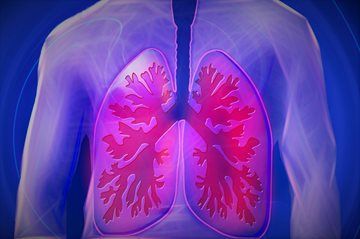
What is Sarcoidosis? | Symptoms, Diagnosis & Treatment
Sarcoidosis is a rare, inflammatory disease that can affect many areas of the body, particularly the lungs and lymph nodes. As the disease progresses, smaller granulomas can join together to create larger nodules that can interfere with the way affected organs function.
While the causes of sarcoidosis are unknown, researchers do have a few theories. Some feel that it may be triggered by exposure to environmental factors like mold, dust or certain bacteria and viruses. Other researchers feel that genetics may play a role in sarcoidosis, and that a certain gene or genes combined with a family history of the disease increase a person’s risk.
Symptoms of Sarcoidosis
Since the disease can affect different organs, symptoms are associated with the organs that have granulomas so symptoms differ. The lungs are the most common place for sarcoidosis to present itself. Symptoms of granulomas in the lungs include cough, wheezing, chest pain and shortness of breath.
Diagnosing Sarcoidosis
Diagnosing Sarcoidosis can be tricky because the symptoms are similar to those of other more commonly occurring diseases. Since symptoms vary and are not always present, sarcoidosis is often discovered when patients are undergoing tests for other reasons.
When sarcoidosis is suspected in the lungs, your doctor may order one or more of the following imaging tests to aid with making a diagnosis:
- Chest X-Ray: Chest X-rays are used to look for pulmonary infiltrates or swollen lymph nodes.
- High Resolution CT Scan: HRCT scans are used to provide a more detailed look at the lungs and lymph nodes than the chest X-ray is able to provide.
- Pulmonary Function Test (PFT): PFT is used to measure how well the lungs are working.
- Bronchoscopy: A bronchosocpy involves passing a small tube down into the bronchial tubes to inspect for granulomas and to take a small tissue sample to rule out infection.
Treating Sarcoidosis
There is no cure for sarcoidosis, but the disease often times gets better on its own over time. Most have mild symptoms and do not require treatment. Treatment is needed only to reduce symptoms and to keep affected organs in proper working order.
Those affected by sarcoidosis are encouraged to:
- Eat a well balanced diet including plenty of fruits and vegetables.
- Drink plenty of fluids every day
- Get six to eight hours of sleep each night
- Quit smoking
- Get regular check ups with your doctor
Drug treatments are used to help manage and relieve symptoms and inflammation. Steroids are often prescribed to treat fatigue and persistent cough.
If you have additional questions about sarcoidosis, are suffering with a persistent cough or other concerning symptoms, or have another respiratory concern the team at Advocare Pulmonary & Sleep are here to help you. Please contact our Exton Office (610) 359-5858 or Lansdale Office (215) 832-0111 to request an appointment with Dr. Mushlin today.
What Is A Pulmonary Function Test? What Should I Expect?
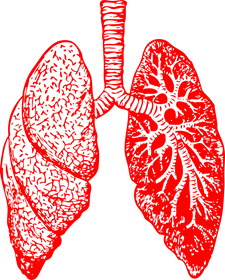
A pulmonary function test is a test that identifies your lung function and measures the ability of your lungs to deliver oxygen to other organs. They measure a patient’s lung volume and capacity, flow rates and gas exchange.
Your pulmonologist may use any of the different pulmonary function tests to aid in giving you a precise diagnosis of your condition and to choose the best treatment plan for you. Pulmonary function tests are used to diagnose and treat pulmonary diseases like asthma, allergy, lung fibrosis, lung cancer and chronic bronchitis.
Pulmonary Function tests can also be used to track the performance of treatment and determine whether your body is responding to treatment.
These tests are non-invasive and rarely cause any complications. On rare occasions pulmonary function tests can cause dizziness, coughing, asthma attacks or shortness of breath. Before your test, make sure you disclose all of your medical information to your doctor, including all medications you take and conditions you have. Your doctor may ask you to stop using certain medications that may skew test results. You should also avoid caffeine and nicotine which can also affect your test results.
Based on your condition and symptoms your doctor may order one or more of the following tests:
- Lung Volumes: Measures the air volume in your lungs.
- Spirometry: Measures the amount of air you inhale and exhale as well as the flow of air.
- Six-Minute Walk Test: Identifies how quickly you can walk on a flat surface for 6 minutes and measures your ability to perform daily tasks.
- Maximal Voluntary Ventilation: Measures the amount of air you can inhale and exhale in one minute.
With the large number of pulmonary function tests available, it’s best to rely on a pulmonologist to determine which you may actually need. If you find yourself suffering from pulmonary symptoms, Advocare Pulmonary and Sleep is here to help! Schedule an appointment with Dr. Mushlin at our Exton or Lansdale office location today.
Does Working Night Shift Affect Sleep? How Can I Adjust?
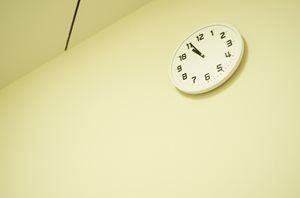
Many professions like nurses, firefighters, police officers and factory workers are required to work outside of the normal 9am-5pm workday. While shift work does create potential productivity advantages, it also comes along with risks.
People who work the night shift and sleep during the day are are at risk for many health issues, like and increased risk for diabetes or heart disease. Sleep deprivation can lead to disorders such as shift work disorder or circadian rhythm sleep disorder.
Circadian rhythm helps our body set its internal clock by adapting to a normal sleep schedule. It is responsible for regulating the release of melatonin, a hormone that helps make us sleepy and keeps us asleep through out the night. The circadian rhythm is influenced by many things, including light and temperature, but needs to be “set” in our internal system. (This is why babies don’t usually sleep through the night until they are a few months old. They need to adapt to a pattern of sleep.)
Adjusting To Working Night Shift
Shift workers must find ways to cope and in small ways they can retrain their circadian rhythm to allow them to sleep during the day. Many studies have shown if you are committed to making sleep a priority you can impact the amount and quality of sleep you are able to get doors the day. Here are a few tips to help your body adjust to working night shift:
- Avoid caffeine, nicotine and alcohol: all of which are stimulants and will work to keep you awake.
- Develop a bedtime routine: Take a shower, brush your teeth, listen to calming music, go to bed at the same time and keep you room on the cooler side. Your brain will learn these cues and know it’s time for sleep.
- Reduce your exposure to daylight during sleep: Exposure to daylight is a cue to your brain that it’s time to be awake. You can trick your brain into thinking it’s nighttime by using an eye mask or blackout curtains.
- Go to bed as soon as you get home: Minimize activities that stimulate the brain or expose you to daylight.
Sleep is an important part of your overall health and wellbeing and getting a good night’s sleep will allow you to concentrate and focus on your job. If you find yourself struggling with sleep, Advocare Pulmonary and Sleep Specialists can help. Dr. Mushlin is trained to evaluate and treat sleep disorders that result from shift work. Contact our Exton office (610) 359-5858 or Lansdale office (215) 832-0111 to schedule your appointment today.
Image courtesy of dnfcnlsrn0 at pixabay.com
Can Untreated Sleep Apnea Cause Me To Gain Weight?

Many people underestimate the importance of getting a healthy night’s sleep. Getting enough sleep not only allows you to feel well rested, but also helps your body stay healthy because it can focus on repairing and regulating itself while you’re asleep.
Lack Of Energy = Less Desire To Exercise
Without proper treatment a Sleep Apnea patient’s sleep is constantly interrupted making it impossible for them to get enough of the quality sleep required by the body. This lack of sleep leaves you low on energy and feeling tired. The last thing you want to do when you feel exhausted is exercise. Lack of exercise can lead to weight gain.
Disruption of Hormone Levels = Poor Food Choices
Not getting a good night sleep due to untreated Sleep Apnea can cause more damage than just a lack of motivation to exercise. Your body performs many functions while you sleep which help you maintain a healthy immune system and balance your appetite. While you sleep ghrelin and leptin, the hormones that play a role in controlling appetite are regulated. Without necessary rest, these levels can be disrupted. Levels of leptin, your body’s natural appetite suppressor decline and while levels of ghrelin, which stimulates appetite becomes elevated. Elevated ghrelin levels cause you to crave more carbohydrates and sugary foods which can lead to weight gain. The National Sleep Foundation suggests that those who do not get enough sleep consume up to 300 extra calories a day and twice as much fat as someone who manages to get the recommended uninterrupted 8 hours.
Creating A Vicious Cycle
Not only can lack of sleep cause you to overeat, but overeating can cause you to experience a variety of sleep problems creating a vicious cycle that is hard to escape from. Snacking on sugary foods an carbohydrates, most of which are highly processed and high in refined sugars, can upset your nervous system making it hard to relax (especially if you’re snacking close to bedtime). To combat the sleepiness you’re feeling you may have an extra cup or two of coffee which not only impacts your blood sugar levels but also stimulates your nervous system making it difficult to relax and fall asleep.
If you think you might be suffering with Sleep Apnea or another sleep disorder, we’re here to help! Contact our Exton office (610) 359-5858 or Lansdale office (215) 832-0111 to schedule an appointment today.
Image courtesy of ben white at unsplash.com
Does Cold Weather Affect My Respiratory Disease? What Can I Do?

When temperatures drop, the air becomes drier. For people with asthma, COPD and bronchitis dry air often leads to irritation, coughing, wheezing and shortness of breath. Cold weather and respiratory disorders are linked in a few ways.
Your airways are lined with a thin layer of fluid. When the air is dry, that fluid evaporates faster than normal, sometimes faster than it can be replaced. This causes your throat to become dry and lead to irritation and swelling which can worsen symptoms.
Cold weather also increases your body’s production of mucus and causes it to become thicker and stickier than in warmer weather. This thicker mucus can cause airway blockages and can increase your chances of catching a cold or other infection.
Dealing With The Cold
There are things you can do to help deal with the cold and the drier winter air. Follow these tips to help avoid the onset of symptoms.
- Monitor the weather forecast: Being prepared and dressing appropriately is a great way to prevent respiratory symptoms. Your immune system slows when you are cold making you more susceptible to illnesses and infections.
- Cover your nose and mouth with a scarf: Loosely wrap a scarf around your nose and mouth. The scarf will help to warm the air before it makes its way to your lungs. This will help prevent the symptoms associated with cold, dry air.
- Avoid exercising in the cold: Exercising outdoors in the cold can really hurt your lungs if you suffer with respiratory problems. As you exercise your breathing and heart rate increase causing you to inhale through your mouth, which can cause irritation and swelling by bringing cold dry air directly to your lungs.
- Breathe in through your nose and out of your mouth: The blood vessels in your nose help warm and humidify the air before it makes its way to your lungs. Breathing through your mouth allows the cold dry air to be delivered straight to your lungs causing irritation.
- Continue to take your medication as prescribed: While taking your medication is important in both warm and cold weather, in cold weather it’s important to be aware of your medication and treatment regimen.
Are you suffering with a respiratory disorder like COPD, bronchitis, asthma or pulmonary hypertension? Advocare Pulmonary and Sleep is here to help diagnose and treat your condition. Contact our Exton or Lansdale office to schedule and appointment with Dr. Mushlin today.
Image courtesy of spencer backman at pixabay.com
What is Alpha-1 Antitrypsin Deficiency? | Prevention, Diagnosis & Treatment

What is Alpha-1 Antitrypsin Deficiency?
Genetics-Resized.jpgAlpha-1 antitrypsin deficiency is an inherited condition (passed from parents to children through genes) which effects the level of the protein Alpha-1 antitrypsin in the bloodstream.
Alpha-1 antitrypsin, also called AAT is a protein that is made in the liver. Normally this protein travels through the bloodstream to other areas of the body where it helps protect the organs, like the lungs, from the harmful effects of other proteins.
AAT deficiency occurs when the AAT proteins being made in the liver are abnormal and cannot be released from the liver at the normal rate. As a result not as many proteins are able to make it to the bloodstream, causing lower numbers to make it to the lungs. Without enough AAT protein, the lungs can be damaged making breathing more difficult.
The lower level of alpha-1 antitrypsin in the bloodstream increases a patients risk of lung disease, and can also increase the risk of liver disease if too many proteins are trapped in the liver.
Signs & Symptoms
Many people who have the condition may not know they have it and do not suffer with serious complications. Symptoms of AAT deficiency typically appear between the ages of 20 and 40 and include:
- Shortness of breath with mild activity
- Lessened ability to be physically active
- Wheezing
- Repeated respiratory infections
- Chronic bronchitis, which cough and phlem production lasts a long time.
- Year-round allergies
- Bronchiectasis
- Tiredness
- Rapid heartbeat upon standing
- Vision problems
- Unintentional weight loss
Prevention
AAT deficiency can not be prevented because the condition is inherited. Even if a patient inherits the genes they may never develop the symptoms or diseases related to this condition.
Patients are able to take steps to prevent or delay lung diseases related to AAT deficiency. The most important step is to quit smoking. Smoking and exposure to tobacco smoke increases the risk of lung related symptoms and lung damage in those with Alpha-1 antitrypsin deficiency. Patient suffering with a severe AAT deficiency can shorten their life expectancy by as much as 20 years if they continue to smoke.
Exposure to second hand smoke, dust, fumes and toxic substances that may be inhaled also increases the risk of lung disease in patients suffering with AAT deficiency.
Diagnosis
AAT deficiency is often diagnosed after a patient develops a lung or liver disease related to the condition. A doctor may suspect AAT deficiency if a patient has signs or symptoms of a serious lung condition without any obvious cause.
AAT deficiency can not be diagnosed by symptoms or a medical examination alone; patients need to get a simple, reliable blood test to know for sure. Typically, three types of tests are done on the blood sample:
- Alpha-1 genotyping which examines a patient’s genes and determines their genotype.
- Alpha-1 antitrypsin PI type of phenotype test, which determines the type of AAT protein a patient has.
- Alpha-1 antitrypsin level tests which determines the amount of AAT protein in a patient’s blood.
Treatment
Ongoing medical care is vital when suffering with AAT deficiency. By working closely with a healthcare team patients will learn how to manage their condition and function at their best.
While there is no cure for AAT deficiency, treatment is available for the symptoms associated with the condition, including:
- Medicines called inhaled bronchodilators and inhaled steroids help open airways making it easier to breathe.
- Vaccines for the flu and pneumococcal diseases to help prevent illnesses which could make conditions worse.
- Prompt treatment of respiratory infections to help prevent further lung damage and complications.
- Pulmonary rehab to learn how to manage conditions and function and allow patients to function at their best.
- Supplemental oxygen, if needed.
- Augmentation therapy which involves getting infusions of the AAT protein to raise the level of the portion in a patient’s blood and lungs. Some researchers believe this may help to slow the development of AAT deficiency in those who have not yet been severely effected.
Image courtesy of geralt at pixabay.com
What Is Obstructive Sleep Apnea? | Symptoms, Complications, Diagnosis and Treatments

What Is Obstructive Sleep Apnea?
Obstructive Sleep Apnea is a sleep disorder that causes breathing to be interrupted throughout a person's sleep cycle. These interruptions are caused by the collapse of soft tissue in the airway which narrows the airway, or closes it off completely preventing the flow of oxygen.
Obstructive Sleep Apnea commonly effects those who are overweight, have large tongues or tonsils, have small jaw bones, have a nasal obstruction/congestion due to a deviated septum, allergies or a sinus problem, or who have a family history of Sleep Apnea. Weight, Smoking and excessive alcohol use can also play a role in Obstructive Sleep Apnea.
Obstructive Sleep Apnea affects your energy level, mental performance and cause poor performance in everyday activities. If left untreated it can impact your longterm health and can even be fatal.
Symptoms and Complications of Obstructive Sleep Apnea
Symptoms of Obstructive Sleep Apnea include:
- Loud snoring
- Trouble falling asleep and/or staying asleep
- Waking up suddenly choking or gasping for air
- Pauses in breathing witnessed by a bed partner
- Frequent nighttime visits to the bathroom
- Excessive daytime fatigue
- Trouble concentrating
- Early morning headaches
Obstructive Sleep Apnea is often associated with conditions like:
- High blood pressure
- Heart disease and heart attack
- Stroke
- Diabetes
- Anxiety and depression
- Overnight heartburn
- Lower pain threshold
- Difficulty with memory
- Chronic sinusitis
- Difficulty losing weight
- Poorly controlled asthma
Diagnosing Obstructive Sleep Apnea
Sleep Apnea can be easily diagnosed through testing:
- Home Sleep Study: A home sleep study is an easy and convenient way to diagnose sleep apnea while allowing patients to stay within the comforts of their own home. During a home sleep study information is collected through sensors applied to the body prior to going to sleep. The information collected will then be reviewed and used to develop a treatment plan.
- In-lab Sleep Study: An in-lab sleep study requires patients to stay over night at a sleep lab. Just like the home sleep study, sensors are applied which allow heartbeat, breathing and movement to be monitored. The information collected is then used to create a treatment plan.
Obstructive Sleep Apnea Treatment
The most important step in treating Obstructive Sleep Apnea is assessment to determining the most appropriate treatment. Treatment options include:
- Continuous Positive Airway Pressure (CPAP): CPAP is one of several ways available for treating sleep apnea. A device is worn during sleep which delivers a continuous flow of air into the nose and mouth providing allowing airways to remain open so patients can breathe regularly while asleep. Use of CPAP can help stop snoring, decrease daytime sleepiness and can lower blood pressure. Our practice has respiratory therapists available to assist with CPAP setups, education and to assist you with questions Monday through Friday.
- Oral Appliances: Oral appliances like a Mandibular Advancement Device are often an effective treatment for Obstructive Sleep Apnea. The device is worn like a mouthguard and helps to ease the lower jaw forward helping to keep the tongue and soft palate stable preventing the airway from collapsing. Advocare Pulmonary and Sleep Specialists has partnerships with local dentists who can assist with fitting oral appliances.
- Positional Therapy: Positional therapy is a method that keeps patients with obstructive sleep apnea in a side sleeping position in order to prevent airway collapse. Positional therapy includes the use products/devices to prevent the patient from sleeping on their back or to assist with elevating the head and trunk to prevent airway collapse.
- Surgery: There are various types of surgery used for the treatment of sleep apnea some of which are multi-step and involve more than one procedure. Advocare Pulmonary and Sleep Specialists has partnerships with Ear, Nose and Throat specialists who can aid in determining whether a surgical procedure is the best course of action.
Image courtesy of nenetus at FreeDigitalPhotos.net

